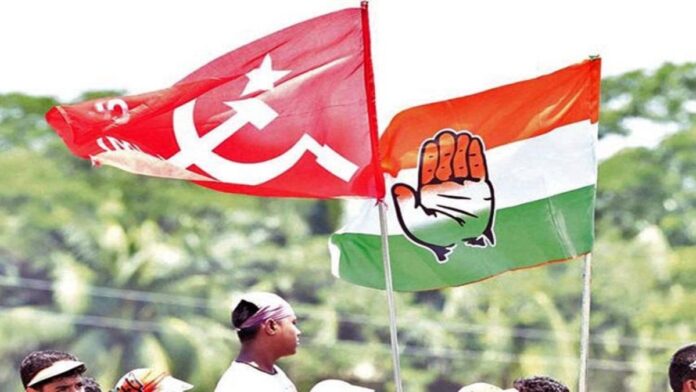Left parties and the Indian National Congress have forged an unprecedented alliance in Tripura, marking a significant departure from decades of ideological divergence and electoral rivalry. The alliance, aimed at challenging the dominant presence of the Bharatiya Janata Party (BJP) in the state, signals a strategic realignment and underscores the imperative for opposition unity in the face of formidable political forces.
Tripura, a northeastern state with a rich history of Leftist influence, has been a bastion of the Communist Party of India (Marxist) (CPI(M)) for nearly three decades until the BJP’s ascendance in recent years. The Left Front, comprising the CPI(M), Communist Party of India (CPI), and other leftist parties, had enjoyed uninterrupted rule in the state until 2018 when the BJP, in alliance with regional parties, swept to power in a historic electoral upset.
Since then, Tripura has emerged as a crucial battleground for opposition forces seeking to challenge the BJP’s hegemony and reclaim lost ground. The Left’s decision to join hands with the Congress, its traditional adversary, underscores the urgency of forging strategic alliances to counter the BJP’s electoral juggernaut and preserve the secular and democratic fabric of the nation.
The alliance between the Left parties and Congress in Tripura is not merely a tactical electoral maneuver but a convergence of ideological forces united by a common commitment to secularism, social justice, and democratic values. Despite their historical differences and occasional acrimony, both sides recognize the imperative of setting aside their ideological divergence in the larger interest of defeating the BJP, which they perceive as a formidable threat to India’s pluralistic ethos.
The decision to contest the two Lok Sabha seats in Tripura jointly reflects a pragmatic recognition of ground realities and the need for opposition consolidation to effectively challenge the BJP’s organizational machinery and electoral prowess. By pooling their resources, expertise, and grassroots networks, the Left-Congress alliance aims to present a credible alternative to the BJP and offer voters a compelling vision for inclusive development and equitable governance.
Moreover, the alliance between the Left and Congress in Tripura carries symbolic significance beyond the confines of state politics. It represents a broader experiment in opposition unity, which has been elusive in Indian politics, particularly in the face of the BJP’s formidable electoral machine. The success or failure of this alliance could set a precedent for future collaborations among opposition parties seeking to counter the BJP’s dominance at the national level.
However, the Left-Congress alliance in Tripura is not without its challenges and contradictions. Both parties bring their respective baggage and ideological nuances to the table, which may pose obstacles to seamless coordination and strategic coherence. Moreover, reconciling their ideological differences on issues such as economic policy, federalism, and regional autonomy will require adept negotiation and compromise on both sides.
Furthermore, the BJP’s formidable organizational machinery, coupled with its polarizing rhetoric and populist appeal, poses a formidable challenge to the prospects of the Left-Congress alliance in Tripura. The BJP’s ability to exploit religious and ethnic fault lines, coupled with its access to vast financial resources and media influence, underscores the uphill battle facing opposition forces in the state.
In addition, the Left-Congress alliance’s decision to contest the two Lok Sabha seats in Tripura marks a significant chapter in the state’s political landscape and holds implications for the broader trajectory of opposition politics in India. By setting aside their historical differences and joining forces, the Left and Congress aim to present a united front against the BJP’s hegemony and offer voters a credible alternative based on principles of pluralism, social justice, and democratic governance. Whether this alliance will succeed in its electoral endeavor remains to be seen, but its significance as a catalyst for opposition unity and democratic consolidation cannot be overstated.



